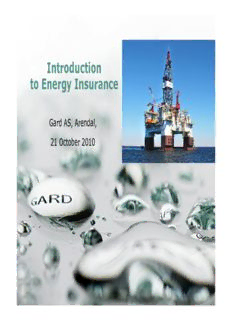
Energy Insurance PDF
Preview Energy Insurance
Introduction to Energy Insurance Gard AS, Arendal, 21 October 2010 What are the main differences between marine and energy insurance? Drilling into unknown underground conditions (Wildcats) o – High pressures – Uncertainty when pressured zones are reached High Risk Operations – release of hydrocarbons o Resourceful Assureds o Insured objects are stationary whilst operating o Tailor made items and parts with long lead time o High values and significant retention/deductible levels o ”Tailor made” insurance policies – manuscript wordings o Low frequency but large and complex losses o Limited case law and market practice o Contents About oil and gas operations o The Energy Insurance Market o Offshore Oil and Gas Exploration and Drilling Operations o Offshore Field Development o Offshore Production and Transport of oil and gas o Claims handling o Piper Alpha – a case study o About oil and gas operations History, Players, Regulation Regimes and Offshore Oil & Gas Theatres Oil and Gas – the core activities Oil, Gas and Condensates = Petroleum o – Petra (rock) + oleum (oil) = petroleum (rock oil) – Fossil fuel Three main activity categories o – Upstream activities (prospecting, exploration, development and extracting/production) – Midstream activities (transport from offshore field to marine terminal/ refinery/petrochemical plant/gas processing & transmission) – Downstream activities (refining, petrochemical, processing, marketing & distribution) Oil and Gas exploration and production players Oil and gas companies (Operator and other license holders) o Rig owners – mobile offshore drilling and accommodation units o Ship-owners – owners of floating units of production, storage o units, shuttle tankers, stand-by and supply vessels or heavy lift vessels Contractors, sub-contractors and suppliers o – Service companies – Helicopter companies – Construction and repair yards/facilities – Equipment vendors and suppliers Phases in the oil and gas industry Exploration Field Development Production Downstream Decommissioning E&P E xploration & P roduction Oil Field Operating Arrangements Joint Venture (JV) o – Licensees or Lease Holders Joint Operating Agreement (JOA) o Operator o Operating Committee o – Sub-Committees Unitization Agreement o Capital Expenditure (Capex) o Operational Expenditure (Opex) o Authorization for Expenditure (AFE) o The role of the Field Operator Usually the license holder with the largest participating interest o Duties o – Obligations and commitments to the government agencies – Management, co-ordination and conduct of JV activities – Standards of care Hold harmless agreement – willful misconduct and gross negligence excepted – Value of agreements before need to obtain non-operators approval – Special circumstances where approval must be obtained Contracting with service providers and vendors o – ”Knock for Knock” agreements
Description: